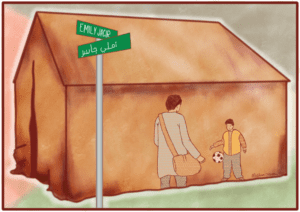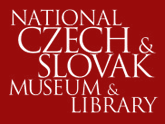Written and illustrated by NCSML intern Melina Testin
“If I could do anything for you, anywhere in Palestine, what would it be?” – Emily Jacir
Emily Jacir is a Palestinian artist and filmmaker, born in Bethlehem in 1973. Jacir grew up in Saudi Arabia, Italy, and finally the United States, where she studied at the Memphis College of Art.
In 2001, Jacir ran an interactive public art project in her New York studio called Memorial to 418 Palestinian Villages Which Were Destroyed, Depopulated, and Occupied by Israel in 1948. Over three months, 140 local Palestinians, Israelis, and others passionate about the cause helped embroider 418 village names onto a canvas refugee tent.
Jacir soon returned to Palestine to begin one of her most notable projects, Where We Come From. Jacir, with the privilege of holding an American passport, famously asked 30 Palestinians facing harsh travel restrictions, “If I could do anything for you, anywhere in Palestine, what would it be?”
 Requests ranged from playing soccer in the street to visiting separated family members. Pieces from this series displayed at the NCSML show how Jacir was able to help two Palestinians: Munir and Mahmoud.
Requests ranged from playing soccer in the street to visiting separated family members. Pieces from this series displayed at the NCSML show how Jacir was able to help two Palestinians: Munir and Mahmoud.
Jacir won the Golden Lion for promising young artists at the Venice Biennale in 2007 for Material for a film, a project continued from late filmmaker Elio Petri researching the assassination of Wael Zuaiter. Jacir’s project combined investigative journalism and art as she interviewed acquaintances and retraced steps to create an exhibit filled with photos, videos, and objects from Zuaiter’s life.
Jacir returned to the Venice Biennale in 2009 in hopes of presenting her project Stazione. Jacir planned to add Arabic signs along the Grand Canal to highlight oft-forgotten Arab influences in Venetian architecture, industry, and language. Stazione received initial approval, but could never be fully realized due to political pressure.
Jacir places a strong focus on helping others through her work, particularly fellow Palestinians who were not given the same opportunities for education and freedom. Jacir inspires others to identify injustice and work towards a peaceful and welcoming world for all.

